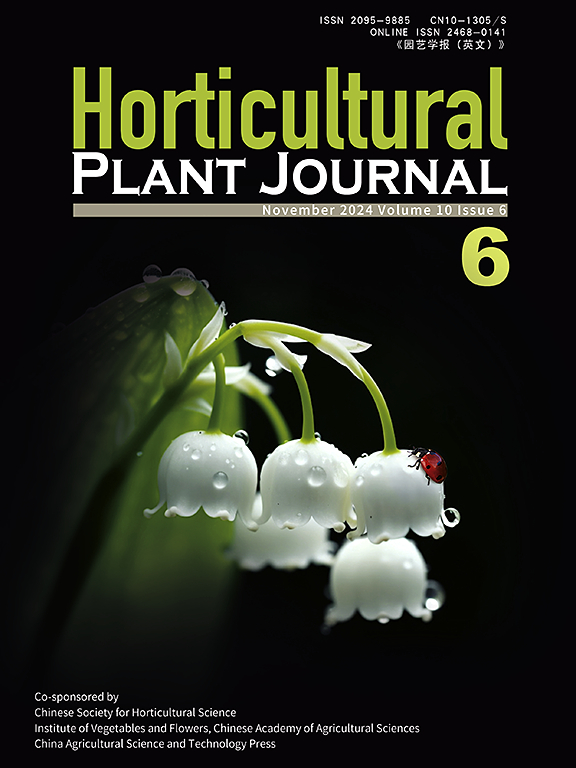Proteomic analysis of leaf apoplast reveals that a jasmonate-regulated CHIA participates in the response to cold and drought stress in jojoba
IF 6.2
1区 农林科学
Q1 HORTICULTURE
引用次数: 0
Abstract
Jojoba is a woody oil crop of economic importance. However, it is sensitive to low temperatures, which hinders its cultivation in temperate arid regions. The apoplast is a cellular component outside the plasma membrane of plant cells and is widely involved in the response of plants to environmental stress. Here, we used the infiltration-centrifugation method to extract apoplast fluid from jojoba leaves and analyzed changes in the apoplast proteome after cold acclimation using quantitative proteomics. In total, 751 apoplast proteins were identified in jojoba, and the abundance of 200 proteins showed significant changes after cold acclimation. These proteins were primarily involved in defense, cell wall modification, carbohydrate metabolism, and redox balance. We also investigated the function and regulation of a cold acclimation-responsive class III chitinase对荷荷巴叶片外质体的蛋白质组学分析表明,茉莉素调控的CHIA参与了荷荷巴对寒冷和干旱胁迫的响应
荷荷巴是一种具有重要经济价值的木本油料作物。然而,它对低温很敏感,这阻碍了它在温带干旱地区的种植。外质体是植物细胞质膜外的一种细胞成分,广泛参与植物对环境胁迫的反应。本研究采用浸润-离心法提取荷荷巴叶片外质体液,利用定量蛋白质组学分析冷驯化后外质体蛋白质组的变化。共鉴定出751个外质体蛋白,其中200个蛋白在冷驯化后丰度发生了显著变化。这些蛋白质主要参与防御、细胞壁修饰、碳水化合物代谢和氧化还原平衡。我们还研究了冷驯化响应型III类几丁质酶ScCHIA的功能和调控。结果表明,ScCHIA的过表达增强了拟南芥、酵母和荷荷巴对低温和渗透胁迫的耐受性。在低温胁迫下,过表达scchia的拟南芥积累了更多的渗透物质,激活了抗氧化酶,气孔孔径减小,这可能是其对低温胁迫的耐受性增强的原因之一。应用茉莉酸甲酯(MeJA)诱导ScCHIA,电泳迁移量转移实验(EMSA)、酵母单杂交(Y1H)和荧光素酶活性实验表明,ScCHIA基因启动子上的E-box顺式作用元件通过MeJA信号介导ScCHIA的调控,表明冷驯化引起的MeJA水平升高可能促进ScCHIA的表达,从而增强荷荷巴的耐寒性。本研究强调了外质体在植物低温胁迫响应中的重要作用,提高了对植物几丁质酶在非生物胁迫响应中的功能和调控机制的认识。
本文章由计算机程序翻译,如有差异,请以英文原文为准。
求助全文
约1分钟内获得全文
求助全文
来源期刊

Horticultural Plant Journal
Environmental Science-Ecology
CiteScore
9.60
自引率
14.00%
发文量
293
审稿时长
33 weeks
期刊介绍:
Horticultural Plant Journal (HPJ) is an OPEN ACCESS international journal. HPJ publishes research related to all horticultural plants, including fruits, vegetables, ornamental plants, tea plants, and medicinal plants, etc. The journal covers all aspects of horticultural crop sciences, including germplasm resources, genetics and breeding, tillage and cultivation, physiology and biochemistry, ecology, genomics, biotechnology, plant protection, postharvest processing, etc. Article types include Original research papers, Reviews, and Short communications.
 求助内容:
求助内容: 应助结果提醒方式:
应助结果提醒方式:


